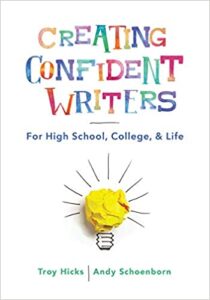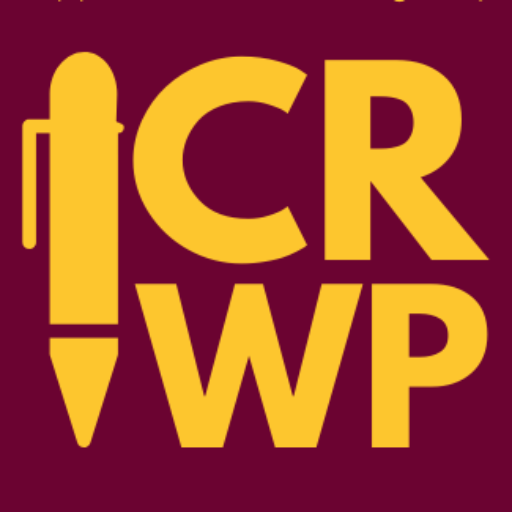On December 10, 2022, the Chippewa River Writing Project hosted a free continuity event: NCTE Comes to the CRWP. Teacher consultants from the CRWP who presented at the NCTE Annual Convention in November shared their presentations with us. This is the second post in a three-part series describing the presentations from our TCs.

Sharing the insights from one of his students, Andy Schoenborn described the way that she talked about his course. “Schoenborn,” she said, “I haven’t read a book in years, or written anything longer than a few sentences in forever. Your class is like scaling a mountain!” And, with that, Andy invited us into his reading and writing workshop, borrowing an opening question from a CRWP colleague, Travis Crowder, “Where does writing come from?” (For more insights from Travis, view his February 2022 webinar, “Leaning into Invitations and Appreciation.”)
For Andy, writing comes from one’s own lived life. And, in his teaching context, this question helps Andy’s students — who often feel as if they do not have anything to contribute to the conversation — begin to see themselves as writers and find their voice. Drawing ideas from Chavez’s book, The Anti-Racist Writing Workshop (2021), Andy reminded us that “Writing is a relationship with the self, after all. It’s a ritual of tuning in and listening to the language inside of us” (Chavez, p. 98). As he has for many years, Andy still relies on poetry as a way to invite his own students into poetry.
He invited us to contribute our own “writing comes from” responses into a “tumble down” response by modeling his own writing in a Google Doc. Having already written in a stream-of-consciousness manner, Andy then took his initial paragraph of writing in the Google Doc and began placing hard returns to separate lines. He also added indents to some lines and, in an e.e. cummings-like style, even separated single letters of some words with the hard returns, pushing them down the page. After modeling this process for us, Andy invited us to return to our writing and try tumbling down our own words. (For more on this “tumble down” strategy, see Andy’s April 2022 blog post on Ethical ELA.)
 In the second half of his session, Andy invited us into his classroom, sharing his students’ deep dislike — some went so far as to say “hate” — for reading and writing. Yet, as Andy continues to work with his students, he continues to offer invitations, as described in his book, Creating Confident Writers (2020). These invitations come from a variety of sources, including Button Poetry, #Verselove, and his own collection of curated student work, Live Write. Through all this work, Andy relies on the Framework for Success in Postsecondary Writing and its “habits of mind” such as curiosity, persistence, and flexibility as guiding principles for his work with students.
In the second half of his session, Andy invited us into his classroom, sharing his students’ deep dislike — some went so far as to say “hate” — for reading and writing. Yet, as Andy continues to work with his students, he continues to offer invitations, as described in his book, Creating Confident Writers (2020). These invitations come from a variety of sources, including Button Poetry, #Verselove, and his own collection of curated student work, Live Write. Through all this work, Andy relies on the Framework for Success in Postsecondary Writing and its “habits of mind” such as curiosity, persistence, and flexibility as guiding principles for his work with students.
From there, he reminded us that poems are inherently multimodal, and can invite students to focus on various modes in their composing process including the linguistic, visual, aural, spatial, and gestural modes. In addition to sharing videos of spoken word poets in action, Andy also has his own “Featured Poet Friday” where students are invited to share a spoken word poem, and the recording is shared through district-level email newsletters. Reminding us of the power of poetry, Andy quotes Patrice Vecchione, from her book, My Shouting, Shattered, Whispering Voice:
“Writing poems is a way to uncover what most needs to be uncovered — to loosen the tongue in solitude, to make connections that can’t be made in conversation. Poems are made of questions more than answers.” (Vecchione, p. xiii-xiv)
As he concluded, Andy encouraged participants to simply “let students write,” and in doing so they will get to deeper, more personal levels than they may have ever achieved in the past. We can invite students to move well beyond the typical kinds of school writing and, instead, help them to scale mountains.
For more on Andy’s presentation, his slides are available as a “view only” document, and she can be reached at <aschoenborn@clare.k12.mi.us>.


Leave a Reply
You must be logged in to post a comment.